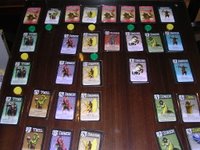Game Nights
 I'm getting so spoiled by my incredible access to gaming opportunities; seven games in two days, and I'm still raring to go. I definitely enjoy a nice mix of pace and mechanics.
I'm getting so spoiled by my incredible access to gaming opportunities; seven games in two days, and I'm still raring to go. I definitely enjoy a nice mix of pace and mechanics.Two very different games described here have a tactic in common. Can you guess?
Wednesday night at the Condo:
Nexus Ops: First time for me. Just ok. I'm not a fan of the physical design. What makes the game work is the six unique creatures and the Mission/Energize cards.
Timbuktu: First time for all of us. Good game, but I'm not sure how good yet. I was able to remember which pens I'd seen, and which should be avoided that I hadn't seen. I was not able to factor in making deductions from what the opponents did. It wasn't until the scoring phase that we all realized we'd forgotten to account for goods value in our decisions.
Colossal Arena: First time for me. This was the hit of the night. I knew that my Geek Buddies ranked this game very highly. I had loosely skimmed the rules a while back, but was not prepared for the experience. This game is incredible. A little luck, a little guess-work, a little bluffing, a little risk, yet every decision you make is important. There can be a high screwage factor, but it makes this game fun. It's already on my want list.
Exxtra: First time for me. Another Knizia instant hit. How much fun can you have with 2 dice? A lot.
Thursday night at home:
Clans: This game is an excellent 2p abstract. I managed to convince my opponent that I did not have red, even though red led the pack for the entire game. The final brilliant move made it impossible for red not to score equal points to any village completed.
Meridian: First time for both of us. Another great Colovini game, but under-appreciated on the Geek. Players compete for control of islands--worth 3-5 points each--by placing stacks of towers. The catch is that the islands are mostly horizontal, while the playing opportunities are vertical. That is, you play towers by column based on cards you have. Towers must always be arranged in height order. If you place a tower stack onto an existing tower stack, it shifts up or down the column based on the relative heights (if there's room to shift). For example, if the 4 column has towers of heights -124- (dashes represent empty locations), then if you place a tower stack of height 3 on top of the 2, the result will be 1234-. If you place a stack of 5 on top of the 4, the result will be 1245-. Shifted towers usually change islands, which can drastically affect the control.
DVONN: Setup tactics still elude us. It's mostly random other than making sure we have pieces in all sections of the board, split between edge and center, and near the 3 DVONN pieces. Things were pretty even looking at the half-way point. I made an unexpected crushing move that cleared more than half the board. After this, I thought a sequence of forced moves was going to lose the game for me, but I found a play that dumped a tall enemy stack.
Did you figure out the two games with a common tactic?
Colossal Arena and Meridian. In both games, committing to an important play too early simply wastes the card. Later plays can virtually undo any position. You have to wait until the last possible moment, but this can cause you to miss out when unexpected things happen.
Colossal Arena image by myludien.





0 Comments:
Post a Comment
<< Home